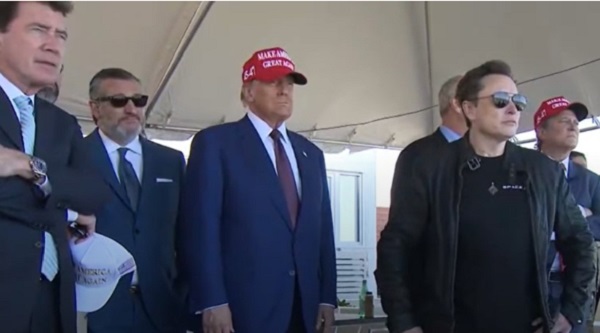Business
Trump’s Initial DOGE Executive Order Doesn’t Quite ‘Dismantle Government Bureaucracy’


From the Daily Caller News Foundation
By Thomas English
President Donald Trump’s Monday executive order establishing the Department of Government Efficiency (DOGE) presents a more modest scope for the initiative, focusing primarily on “modernizing federal technology and software.”
The executive order refashions the Obama-era United States Digital Service (USDS) into the United States DOGE Service. Then-President Barack Obama created USDS in 2014 to enhance the reliability and usability of online federal services after the disastrous rollout of HealthCare.gov, an insurance exchange website created through the Affordable Care Act (ACA). Trump’s USDS will now prioritize “modernizing federal technology and software to maximize efficiency and productivity” under the order, which makes no mention of slashing the federal budget, workforce or regulations — DOGE’s originally advertised purpose.
“I am pleased to announce that the Great Elon Musk, working in conjunction with American Patriot Vivek Ramaswamy, will lead the Department of Government Efficiency (‘DOGE’),” Trump said in his official announcement of the initiative in November. “Together, these two wonderful Americans will pave the way for my Administration to dismantle Government Bureaucracy, slash excess government regulations, cut wasteful expenditures, and restructure Federal Agencies.”
The order’s focus on streamlining federal technology and software stands in contrast to some of DOGE’s previously more expansive aims, including Elon Musk’s claim that “we can [cut the federal budget] by at least $2 trillion” at Trump’s Madison Square Garden rally in November. Musk now leads DOGE alone after Vivek Ramaswamy stepped down from the initiative Monday, apparently eying a 2026 gubernatorial run in Ohio.
The order says it serves to “advance the President’s 18-month DOGE agenda,” but omits many of the budget-cutting and workforce-slashing proposals during Trump’s campaign. Rather, the order positions DOGE as a technology modernization entity rather than an organization with direct authority to enact sweeping fiscal reforms. There is no mention, for instance, of trillions in budget cuts or a significant reduction in the federal workforce, though the president did separately enact a hiring freeze throughout the executive branch Monday.
“I can’t help but think that there’s more coming, that maybe more responsibilities will be added to it,” Susan Dudley, a public policy professor at George Washington University, told the Daily Caller News Foundation. Dudley, who was also the top regulatory official in former President George W. Bush’s administration, said the structure of the new USDS could impact the recent lawsuits against the DOGE effort.
“I think it maybe moots the lawsuit that’s been brought for it not being FACA,” Dudley said. “So if this is how it’s organized — that it’s people in the government who bring in these special government employees on a temporary basis, that might mean that the lawsuit doesn’t really have any ground.”
Three organizations — the American Federation of Government Employees (AFGE), National Security Counselors (NSC) and Citizens for Responsibility and Ethics in Washington (CREW) — separately filed lawsuits against DOGE within minutes of Trump signing the executive order. The suits primarily challenge DOGE’s compliance with the Federal Advisory Committee Act (FACA), alleging the department operates without the required transparency, balanced representation and public accountability.
The order also emphasizes not “be construed to impair or otherwise affect … the authority granted by law to an executive department or agency, or the head thereof; or the functions of the Director of the Office of Management and Budget relating to budgetary, administrative, or legislative proposals.”
“And the only mention of OMB [Office of Management and Budget] is some kind of boilerplate at the end — that it doesn’t affect that. But that’s kind of general stuff you often see in executive orders,” Dudley continued, adding she doesn’t “have an inside track” on whether further DOGE-related executive orders will follow.
“It’s certainly, certainly more modest than I think Musk was anticipating,” Dudley said.
Trump’s order also establishes “DOGE Teams” consisting of at least four employees: a team lead, a human resources specialist, an engineer and an attorney. Each team will be assigned an executive agency with which it will implement the president’s “DOGE agenda.”
It remains unclear whether Monday’s executive order comprehensively defines DOGE, or if additional orders will be forthcoming to broaden its mandate.
Internet
US government gave $22 million to nonprofit teaching teens about sex toys: report

From LifeSiteNews
The Center for Innovative Public Health Research’s website suggests teenage girls make their ‘own decisions’ about sex and not let their parents know if they don’t want to.
For almost a decade, the U.S. government funded a group that actively works to teach kids how to use sex toys and then keep them hidden from their parents to the tune of $22 million.
According to investigative reporter Hannah Grossman at the Manhattan Institute, The Center for Innovative Public Health Research (CIPHR) has been educating minors about sex toys with public funds.
Records show that the millions given to the group since 2016, according to its website, go toward “health education programs” that “promote positive human development.”
However, the actual contents of the programs, as can be seen from comments from CIPHR CEO Michele Ybarra, seem to suggest that its idea of “human” development is skewed toward radical sex education doctrine.
In 2017, CIPHR launched Girl2Girl, which is funded by federal money to promote “sex-ed program just for teen girls who are into girls.” Its website lets users, who are girls between ages 14 and 16, sign up for “daily text messages … about things like sex with girls and boys.”
The actual content of some of the messages is very concerning. Its website notes that some of the texts talk about “lube and sex toys” as well as “the different types of sex and ways to increase pleasure.”
The website actively calls upon teenage girls to make their “own decisions” and not let their parents know if they don’t want to.
Grossman shared a video clip on X of Ybarra explaining how they educate minors about the use of “sex toys” and dealing with their parents if they are found out.
The clip, from a 2022 Brown University webinar, shows Ybarra telling researchers how to prepare “young person(s)” for her research.
She said if they are doing “focus groups,” she will ask them, “Okay, so what happens if somebody comes into the room and sees words like penis and sex toys on your screen — on your computer screen or on your phone? What if it’s your mom?’”
In 2023, CIPHR launched Transcendent Health, which is a sex-education program for minors who are gender confused. This initiative received $1.3 million of federal grant money that expired last month.
Grossman observed that the federal government “should not fund programs that send sexually explicit messages to minors and encourage them to conceal these communications from parents.”
She noted that in order to protect children and “prevent further harm,” U.S. President Donald Trump’s Department of Health and Human Services “should immediately cancel CIPHR’s active contract and deny its future grant applications.”
“By doing so, the Trump administration can send a clear message: Taxpayers will no longer foot the bill for perverted ‘research’ projects,” she noted.
The Trump administration has thus far, through the Department of Government Efficiency (DOGE), exposed billions in government waste and fraud. Many such uses of taxpayer dollars are currently under review by the administration, including pro-abortion and pro-censorship activity through USAID, “Diversity, Equity, and Inclusion and neo-Marxist class warfare propaganda” through the National Science Foundation, and billions to left-wing “green energy” nonprofits through the Environmental Protection Agency.
Business
Canadian Police Raid Sophisticated Vancouver Fentanyl Labs, But Insist Millions of Pills Not Destined for U.S.

 Sam Cooper
Sam Cooper
Mounties say labs outfitted with high-grade chemistry equipment and a trained chemist reveal transnational crime groups are advancing in technical sophistication and drug production capacity
Amid a growing trade war between Washington and Beijing, Canada—targeted alongside Mexico and China for special tariffs related to Chinese fentanyl supply chains—has dismantled a sophisticated network of fentanyl labs across British Columbia and arrested an academic lab chemist, the RCMP said Thursday.
At a press conference in Vancouver, senior investigators stood behind seized lab equipment and fentanyl supplies, telling reporters the operation had prevented millions of potentially lethal pills from reaching the streets.
“This interdiction has prevented several million potentially lethal doses of fentanyl from being produced and distributed across Canada,” said Cpl. Arash Seyed. But the presence of commercial-grade laboratory equipment at each of the sites—paired with the arrest of a suspect believed to have formal training in chemistry—signals an evolution in the capabilities of organized crime networks, with “progressively enhanced scientific and technical expertise among transnational organized crime groups involved in the production and distribution of illicit drugs,” Seyed added.
This investigation is ongoing, while the seized drugs, precursor chemicals, and other evidence continue to be processed, police said.
Recent Canadian data confirms the country has become an exporter of fentanyl, and experts identify British Columbia as the epicenter of clandestine labs supplied by Chinese precursors and linked to Mexican cartel distributors upstream.
In a statement that appears politically responsive to the evolving Trump trade threats, Assistant Commissioner David Teboul said, “There continues to be no evidence, in this case and others, that these labs are producing fentanyl for exportation into the United States.”
In late March, during coordinated raids across the suburban municipalities of Pitt Meadows, Mission, Aldergrove, Langley, and Richmond, investigators took down three clandestine fentanyl production sites.
The labs were described by the RCMP as “equipped with specialized chemical processing equipment often found in academic and professional research facilities.” Photos released by authorities show stainless steel reaction vessels, industrial filters, and what appear to be commercial-scale tablet presses and drying trays—pointing to mass production capabilities.
The takedown comes as Canada finds itself in the crosshairs of intensifying geopolitical tension.
Fentanyl remains the leading cause of drug-related deaths in Canada, with toxic supply chains increasingly linked to hybrid transnational networks involving Chinese chemical brokers and domestic Canadian producers.
RCMP said the sprawling B.C. lab probe was launched in the summer of 2023, with teams initiating an investigation into the importation of unregulated chemicals and commercial laboratory equipment that could be used for synthesizing illicit drugs including fentanyl, MDMA, and GHB.
The Bureau is a reader-supported publication.
To receive new posts and support my work, consider becoming a free or paid subscriber.
Invite your friends and earn rewards
-

 2025 Federal Election1 day ago
2025 Federal Election1 day agoRCMP memo warns of Chinese interference on Canadian university campuses to affect election
-

 2025 Federal Election1 day ago
2025 Federal Election1 day agoResearchers Link China’s Intelligence and Elite Influence Arms to B.C. Government, Liberal Party, and Trudeau-Appointed Senator
-

 Alberta2 days ago
Alberta2 days agoAlberta takes big step towards shorter wait times and higher quality health care
-

 Business2 days ago
Business2 days agoTrump raises China tariffs to 125%, announces 90-day pause for countries who’ve reached out to negotiate
-

 2025 Federal Election1 day ago
2025 Federal Election1 day agoThe status quo in Canadian politics isn’t sustainable for national unity
-

 2025 Federal Election1 day ago
2025 Federal Election1 day agoPoilievre Announces Plan To Cut Taxes By $100,000 Per Home
-

 2025 Federal Election23 hours ago
2025 Federal Election23 hours agoTwo Canadian police unions endorse Pierre Poilievre for PM
-

 Business2 days ago
Business2 days agoScott Bessent Says Trump’s Goal Was Always To Get Trading Partners To Table After Major Pause Announcement






